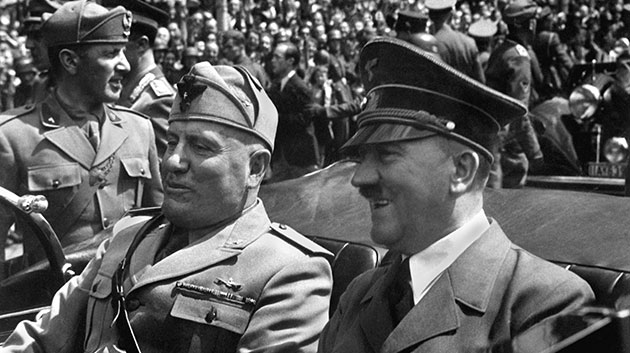The Meaning of Fascism: Looking at the Life of Mussolini Part 1
Key points in this article:
- Dark times in the Italian Peninsula gave birth to fascism
- National Fascist Party was anti-socialism and anti-liberalism
- Mussolini’s political creed was “I don’t care”
Doubtless we are all familiar with the word “fascism” used as an insult thrown around in the world of politics. It gives the impression of a dangerous dictator, but not many people know the actual meaning of the word.
A famous example of a fascist government was Hitler’s Nazism, but the word fascism comes from the National Fascist Party, an Italian political party created by Benito Mussolini.
This article will look at the strange life of the father of fascism, Mussolini, from which we can gather the meaning of fascism.
Dark Times in the Italian Peninsula
Mussolini grew up in Italy in dark times. Until recently, Italy was not the unified nation it is today, but was comprised of various small city-states. The people were divided into these separate powers that were hostile to each other.
At the time, their democratic system was just for appearances, and their constitutional government ended in failure probably due to remnants of the previous monarchial culture.
In addition, while Italy emerged victorious in WWI after discharging their full force, territorial acquisition did not go as planned. Unable to feel the reality of their victory, the people became restless.
Piling war expenses devastated national finances. A lack of commodities invited hyperinflation. Soldiers who risked their lives returned only to find their beloved fatherland in disarray. They were inevitably made to do menial jobs to maintain a living. Chances are they would have all been thinking, “What were we fighting for?”
In those poverty-stricken times, factory workers would strike in imitation of the Russian Revolution. Hard times continued.
National Fascist Party Was Anti-Socialism and Anti-Liberalism
One man stood up in amongst the shadows: Benito Mussolini.
Liberalism, parliamentary government and socialism are dead, he thought, and thus he formed the Fasci Italiani di Combattimento (Italian Combat Squad) in the hope of creating a powerful Italy. This later became the National Fascist Party: the party that wound up plunging Italy into deeper chaos.
What Is Fascism?
So what did the National Fascist Party uphold?
In fact, this is heavily debated even amongst scholars today: if it isn’t liberalist or socialist, then what is it?
The word “fascio” means “group” or “bundle” in Italian. The National Fascist Party did have strong bonds. In one sense, totalitarian Italy was also a grouping together.
But that doesn’t help explain what they actually wanted to do by grouping together. We have no idea what Mussolini’s idea of a powerful Italy was.
Mussolini Didn’t Care About Ideology
In fact, Mussolini’s own political philosophy is also shrouded in mystery. He was originally a socialist before forming the National Fascist Party, which openly rejected socialism. And he was also originally a pacifist.
From a young age, he joined the socialist and pacifist movements, and was well known for his oratory skills. He was praised for his achievements and was one day invited by a leading member of the Italian Socialist Party to assume the post of editor for their newspaper.
Initially he promoted socialism and pacifism in the paper, but one day he suddenly made a radical transformation to revolutionary nationalism. He was expelled from the Socialist Party.
There are a number of theories on why he experienced such a dramatic change.
The strongest theory is that Mussolini probably wanted to do something to destroy the old order; and while he initially sought socialism as the tool for destruction, he felt its impotence and decided to change his ideology.
Back when he was still a socialist, he wrote in the newspaper, “as people, as socialists, are we not guilty of being mere bystanders in confronting the unfolding of a grand spectacle?”
Perhaps his change in ideology was his attempt to savor this grand spectacle with a new purpose. In other words, he didn’t care about the ideology; he just wanted to do something – anything – dramatic.
Mussolini said in his speech soon after the formation of the National Fascist Party that he can interchangeably be aristocratic and democratic, conservative and progressive, reactionary and reformist.
He obviously didn’t care.
A historian once aptly remarked, “Fascist ideology is basically ideology-soup”.
Fascist Principle Is “Denial”
Master Ryuho Okawa founder of Happy Science commented on the principle of fascism thus:
“Peter F. Drucker analyzed fascist states and said that the basic principle of totalitarianism and fascism is ‘denial’.
They just keep denying everything: things that came before, tradition, things that are here and now. They just deny it all, and never say what they themselves want to do, he says. What all forms of totalitarianism have in common is denial.”
“Fascism appears in crises where people want someone to come along and solve the problems that plague them. Fascism appears during a mobocracy, and when it begins to associate with militarism, it becomes a deadly and war-loving system.”
Part 2 will explore how the Fascist Party with its strange ideology, assumed one-party dictatorial rule, began war with neighboring countries, and eventually fell.



















